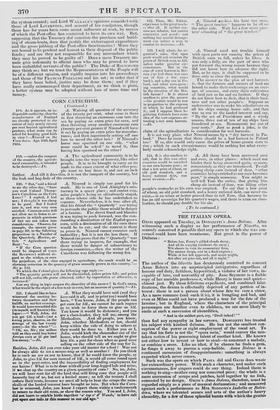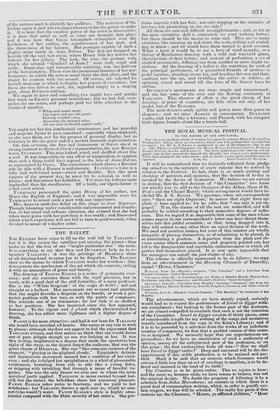THE ITALIAN OPERA.
GRISI appeared on Tuesday, in DONIZETTI'S Anna Bolena. After witnessing such a display as her performance of Ninetta, we scarcely conceived it possible that any opera in which she was con- cerned could have been wearisome. But great is the power of Dulness : " Before her, Fancy's gilded clouds decay, And all its varying rainbows die away ; Wit shoots in vain its momentary fires, The meteor drops, and in a flash expires ; While at her felt approach, and secret might, Art after art goes out, and all is night."
The author of the libretto has dexterously contrived to convert Anne Boleyn into an unprincipled intrigatrice, regardless of honour and duty, faithless, hypocritical, a violator of her vows, in- capable of love, and unworthy of pity. Jane Seymour is a feeble copy of her amiable predecessor, while Henry is tame and quiet— almost just. By these felicitous expedients, and combined falsi- fications, the drama is effectually deprived of any portion of in- terest : there is not a person about whose fate we care a straw. As a mere romance (and such it is), it is bungling and bad, and even at Milan could not have produced a tear for the fate of the heroine; but in England, where the characters of the principal personages are familiar even to children, we are more likely to smile at such a succession of absurdities,
" And in the saddest part, cry, 'Droll indeed! '"
than feel any sympathy in her sorrows. DowizErri has treated his subject with kindred dulness. He has not the smallest con- ception of the power or right employment of the vocal art. To say that his forte is not the "opera seria," would convey the mis- taken notion of his possessing talent of another kind. He knows not either how to invent or how to steal—to construct a melody, or combine a score. Like an idiot, if by chance he finds a gem, he flings it away to pursue a soap-bubble. Anna Bolena is a continued succession of disappointments; something is always expected which never conies. Such was the opera on which PASTA did and GRISI does waste her extraordinary power. With such a character, and under such circumstances, few singers could do any thing. Indeed there is nothing to sing—neither song nor concerted piece : the whole is a mere succession of scraps and patches, held together by no link, cemented by no design. GRISCS Anna Bolena, therefore, must be regarded simply as a piece of musical declamation; and measured against such a performance as Mrs. SIMONS'S Isabella or Belvi- dere, where we tolerated scenes and acts of the author's heavy absurdity, for a few of those splendid bursts with which the genius of the actress used to electrify her auditors. The recitative of the Italian opera is just what a singer chooses or has the power to make it. It is here that the creative power of the artist is discernible ; it is here that mind as well as voice are brought into play ; and it was here that GRIST triumphed—triumphed over the feebleness of her author, the repulsiveness of her part, and the drowsiness of her hearers. But passages capable of such a display occur rarely in Anna Bolena. The first act dragged on heavily till the very last scene, where Henry bids her reserve her defence for her judges. The look, the tone, the gesture with which she uttered " Giudici! ad Anna!'" were truly regal and noble. Great also, and inexpressibly touching, was her delivery of the last recitative. These were the prominent beauties of her per- formance; in which the actress must claim the first pl see, and the singer be content with the second. Of course, she selected for herself occasions in which to display her powers of execution ; but these she was driven to seek, for, regarded simply as a singing part, Anna Bolena is nothing. We ought to have said something (we might have said much) last week on GRISI'S personal attractions ; but we had full occu- pation for one sense, and perhaps paid too little attention to the claims of another,
" When such music sweet Our hearts and ears did greet: Divinely warbled voice, Answering the stringed noise,
All our souls in blissful rapture took."
Yet ought not her fine intellectual countenance and her graceful and majestic figure to pass unnoticed ; especially when employed, as she uses them, not for the purpose of personal display, but as tributary to the one great end of a perfect dramatic representation.
On this occasion, the face and demeanour of GRIST stood in strong contrast to those of Percy's representative, the new Russian tenor, IVANHOFF. This man looked, acted, and shuttled about like a serf. It was impossible, by any effort of imagination, to suppose that such a thing could have aspired to the love of Anna Bolena, as represented by GRisi. The coincidence which places a Russian side by side with a Roman is unfortunate. Iv.ssHoEs's voice is a lofty and well-toned tenor—sweet and flexible. But, like most singers of the present day, he must try to astonish as well as please; and this nature has forbidden. Yet were his failures more applauded than his excellencies. Of a truth, our Opera-house is a bad vocal school.
TAMBURINI personated the quiet Henry of his author, not Harry the Eighth of England ; and it was impossible even for TAMBURINI to invest such a part with any importance. Mrs. SEGUIN made her debut on this stage as Jane Seymour. Though labouring under considerable embarrassment and trepida- tion at her novel and arduous situation, she evinced that she had taken more pains with her part than it was worth ; and discovered talent which experience will not fail to turn to good account, when devoted to music of a higher order.





















 Previous page
Previous page